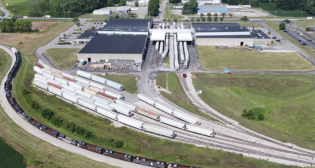
For RMS, Orange EV T-Series is green
Written by William C. Vantuono, Editor-in-ChiefRail Management Services LLC (RMS), one of the largest rail intermodal terminal operators in the U.S., is expanding use of electric trucks following a successful pilot program.
RMS has placed a follow-on order for nine additional T-Series 100% electric terminal trucks from Kansas City-based Orange EV. RMS purchased its first Orange EV truck in July 2016 for evaluation at a Class I intermodal facility in Chicago that Vice President of Maintenance, Safety, Legal and Operations Ed Morgenthaler rates as one of the top-five toughest sites of its 40-plus facilities across the U.S.
“We put the Orange EV truck in Chicago at one of our toughest ramps,” said Morgenthaler. “It’s one of the larger facilities in the country and has been active for decades, making the terrain harsh on hostlers. The Chicago winters also play an important role in it being a difficult location.”
Orange EV offers “a range of configurations built to meet site-specific requirements while managing cost.” The RMS reorder is comprised of nine Extended Duty (160 kWh) trucks, each with galvanized frames but built to three different configurations: new, on-road (DOT compliant), with standard onboard charging; re-manufactured (re-powered), off-road, with off-board fast charging; and re-manufactured, off-road, with standard onboard charging. These trucks are being worked into onsite fleets to supplement and replace RMS’s diesel trucks. Five will be deployed at the same Chicago location while four will be utilized at terminals in New York.
Rail yards and other container handling operations are often located in designated non-attainment areas. “Switching from diesel yard trucks to electric provides immediate emissions reductions and health benefits for workers and surrounding communities,” Orange EV said. “While figures vary by site, we estimate the per-truck emissions eliminated in rail intermodal hub operations annually can be up to 160 tons CO2, 1.7 tons NOx, 1.6 tons CO, and 80 kg PM. Total cost of ownership is reduced as well due to savings in fuel, maintenance and other expenses, enabling fleets to use existing capital and expense budgets planned for diesels. Additional savings of up to 85% of total purchase price are available via incentive programs offered at city, state and federal levels.”
The federal CMAQ (Congestion Mitigation Air Quality) program, administered through state DOTs, is such a program.
RMS’s Morgenthaler was skeptical at first. “I didn’t expect the truck to be as reliable as it is,” he said. “Although we had hiccups at first, the Orange EV guys got right on it and quickly rectified the situation. The New York sites are also difficult environments with lots of snow, ice, and rough ramps, but after the Chicago pilot, I feel confident that the trucks will be very reliable.”
“RMS has done an incredibly thorough job of evaluating and understanding our technology—why and how to use it—while making us better in the process,” said Orange EV Chief Commercial Officer Mike Saxton. “Our goal with RMS and all customers is to ensure that Orange EV trucks deliver the promised value in a complete electric truck solution that does the job while making economic sense. It’s gratifying that 75% of our [customers] have re-ordered within six months of receiving their first Orange EV truck.”



